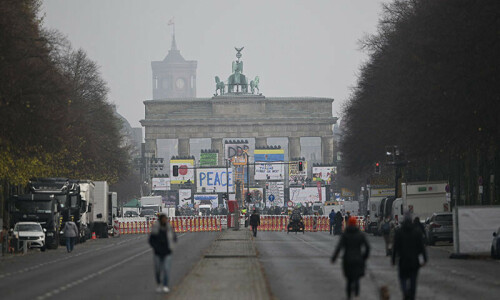RIYADH, Oct 18: The Opec has been cornered into an emergency mode. The dramatically falling prices have compelled the oil cartel to bring the emergency meeting forward by almost three weeks. Nov 18 could indeed have been another date. Hence, on second thought, the Opec is meeting on Friday (Oct 24).
A new era of aggressive market management is on the anvil and seems inevitable. David Kirsch of PFC Energy, the Washington consultant firm, thinks that with demand falling, Opec is entering a phase of much more active management of the oil market, including more frequent meetings.
Softening crude markets highlight another crucial aspect – the sordid role of the speculators in taking the market to the dizzying July heights. With prices falling, speculators are apparently taking money out of the energy markets. “As demand fell, so did prices, and as prices have fallen, investors have begun pulling money out of the oil market, fearing a collapse, says Leila Benali, of the Cambridge Energy Research Associates.
Investors who earlier this year piled into oil and other commodities, as a hedge against inflation and weak dollar, now want safety. “Commodity indices suffered heavy losses over the past week as market sentiment continues to focus on the potential demand-side weakness associated with the ongoing instability in the financial sector,” Barclays Capital said in a recent note.
And now the issue of over supplies.
Indeed the Iranians, the Libyans, the Qataris, the Venezuelans and some others have been striving to drive this point for the last few weeks now. Being the kingpin within the producers grouping, Saudi Arabia is still quiet, avoiding taking position in public glare – and understandably so.
The facts are bare open.
The 13 members of the Organisation of the Petroleum Exporting Countries pumped an average of 32.47 million bpd of crude in September, 340,000 barrels per day less, a recent Platts Survey confirmed. “At Platts, we see increasing signs of crude and products going unsold on the market,” said Platts Global Director of Oil John Kingston.”
And the situation is getting grimmer - from the oil producers’ perspective - with each passing day. It was just a year ago - on Oct 12, to be exact - that Brent North Sea crude was last trading at as low as $75 a barrel.
To add to their woes, just as global demand has begun to slow, millions more barrels of oil a day from new fields are also to hit the world market.
For oil-producing countries, not only are prices going down, but also their money in the banks, their investments, all are threatened by the current financial crisis, Libya’s oil minister Shokri Ghanem underlined in a press interview.
The overall demand at the global level for the year was reduced by the IEA to 86.5 million barrels per day - a reduction of 240,000 barrels from the previous estimate. The global consumption forecast for next year was also cut by 440,000 barrels per day to 87.2 million barrels per day, showing an annual increase of 0.8 per cent.
Opec would be misguided in the extreme if it were to cut oil production in an attempt to boost oil prices as the northern hemisphere heads towards winter and global inventories remain tight, the London based CGES says in a report to its clients.
British Prime Minister Gordon Brown, scheduled to hold an energy mega event in December, believes a cut in output reportedly being discussed by producing nations would be “wrong for the world economy”.
To what extent Opec succeeds in its endeavours is anybody’s guess. Things may be much beyond the control of the Opec – already.









































Dear visitor, the comments section is undergoing an overhaul and will return soon.